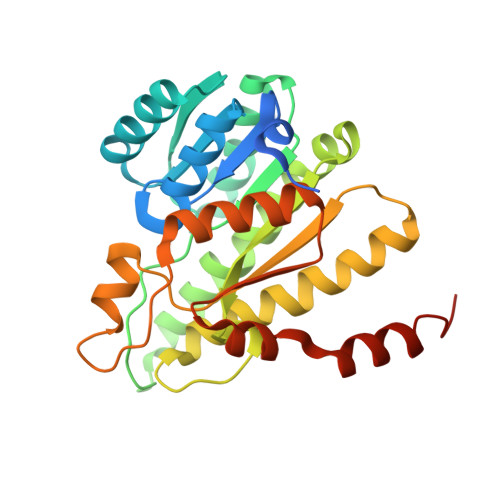Efficacious 11beta-hydroxysteroid dehydrogenase type I inhibitors in the diet-induced obesity mouse model.
Wan, Z.K., Chenail, E., Xiang, J., Li, H.Q., Ipek, M., Bard, J., Svenson, K., Mansour, T.S., Xu, X., Tian, X., Suri, V., Hahm, S., Xing, Y., Johnson, C.E., Li, X., Qadri, A., Panza, D., Perreault, M., Tobin, J.F., Saiah, E.(2009) J Med Chem 52: 5449-5461
- PubMed: 19673466
- DOI: https://doi.org/10.1021/jm900639u
- Primary Citation of Related Structures:
3H6K, 3HFG - PubMed Abstract:
Cortisol and the glucocorticoid receptor signaling pathway have been implicated in the development of diabetes and obesity. The reduction of cortisone to cortisol is catalyzed by 11beta-hydroxysteroid dehydrogenase type I (11beta-HSD1). 2,4-Disubsituted benzenesulfonamides were identified as potent inhibitors of both the human and mouse enzymes. The lead compounds displayed good pharmacokinetics and ex vivo inhibition of the target in mice. Cocrystal structures of compounds 1 and 20 bound to human 11beta-HSD1 were obtained. Compound 20 was found to achieve high concentrations in target tissues, resulting in 95% inhibition in the ex vivo assay when dosed with a food mix (0.5 mg of drug per g of food) after 4 days. Compound 20 was efficacious in a mouse diet-induced obesity model and significantly reduced fed glucose and fasted insulin levels. Our findings suggest that 11beta-HSD1 inhibition may be a valid target for the treatment of diabetes.
Organizational Affiliation:
Chemical Sciences, Wyeth Research, Cambridge, Massachusetts 02140, USA. zwan@wyeth.com
















